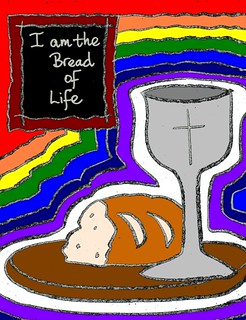Luke 11:3 Give us each day our daily bread.
I
like bread. I like it a lot. Whether it’s the bread that I toast in the
morning, the sandwich that I eat for lunch or in the roll that I may have with
dinner, my conclusion is the same: Bread Rules! When I was growing as a
teenager, I could sometimes eat half a loaf loaf at night with butter and jam.
I don’t know how my folks afforded it, but there was always bread in the pantry
for all of us hungry Stuart kids.
In
Scotland, there is something called a plain loaf which is a doughy loaf of
sliced white bread. At each end of the loaf is a thick slice which is either
called the ‘heel’ or the ‘outsider’. In our house, getting the outsider was an
extra helping, so we took it turns to receive it. Whenever it was toasted,
covered in butter, and put on a plate, I felt as though I was feasting like a
king. As I am writing this, I can still experience crunching through the dark
crust and tasting the texture of the bread. As a poor kid, from a large family,
living in a deprived area, white bread was my staple diet. Eating the thick
crunchy heel was a wonderful blessing that meant a lot to me.
When
the disciples ask Jesus to teach them how to pray, He instructs them to ask God
to give them their daily bread before they ask Him to forgive their sins. He wants
them to rely upon God to sustain them first and then forgive them second. It’s
not that forgiveness is less important than meeting their needs; it’s just that
Jesus wants them to be grateful first and then seek God’s mercy.
Sometimes
I need to remember that lesson. Frequently I feel guilty about my mistakes, so
that when I talk to God in prayer, I reel off a list of sins in order to seek
His mercy first. I forget to be grateful and thank God for His daily goodness; instead
I focus on being forgiven in order to make me feel good. Perhaps if I changed
my prayers to concentrate on thanking God first, then I would not dwell upon
how much I disappointed Him again.
Questions for personal reflection
What are the
daily gifts in my life for which I should be grateful to God? Are my prayers
more about me or God?
Prayer: Lord Jesus, thank You for teaching
us how to pray and for drawing our attention to the daily blessings and needs
that God provides. Keep us from being self-centered or ungrateful. In Your Holy
Name, we humbly pray. Amen.
John
Stuart is the pastor of Erin Presbyterian Church in Knoxville, Tennessee. If
you would like to comment on today’s message, please send him an email to pastor@erinpresbyterian.org.
Today’s
image is a bulletin cover design for Communion drawn by John based upon Christ’s
own words, “I am the Bread of Life.” If you would like to view a larger
version, please click on the following link: http://farm4.staticflickr.com/3560/3770073328_9c57843113_b.jpg


